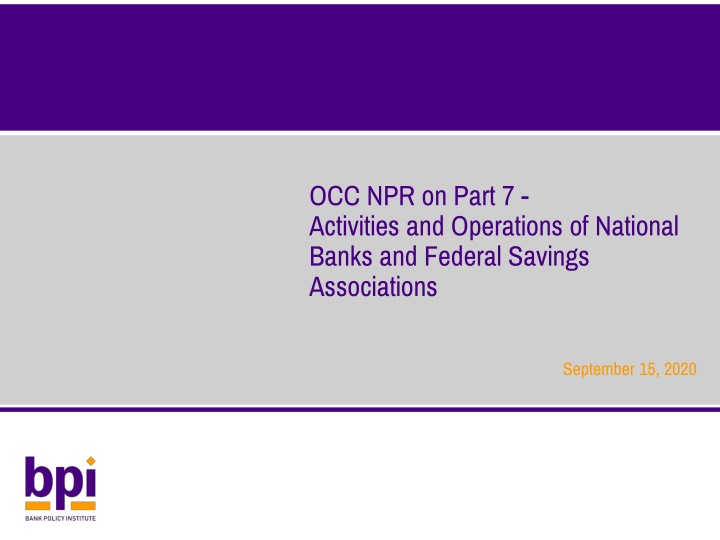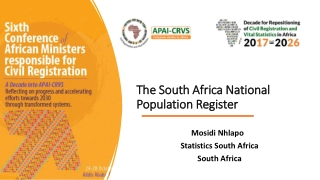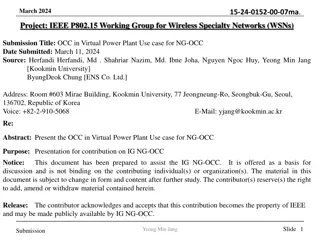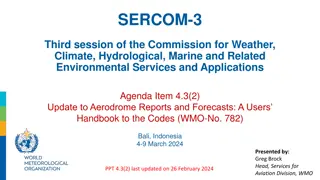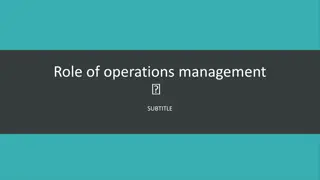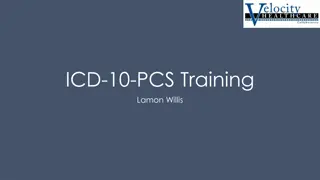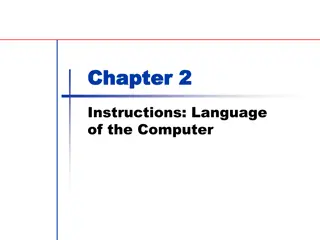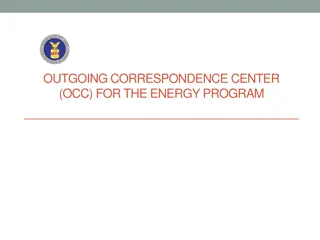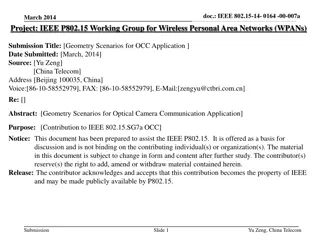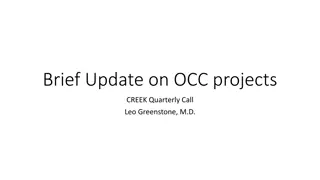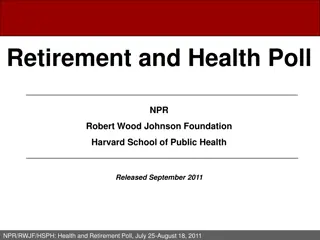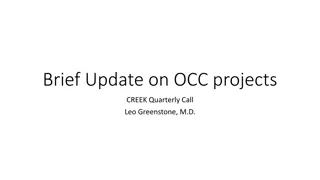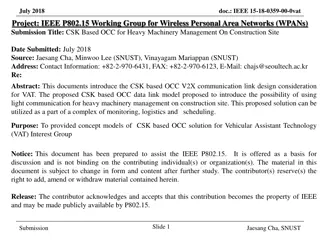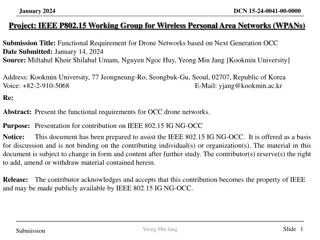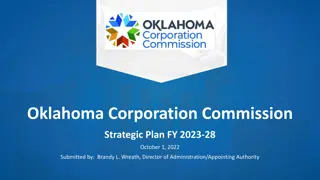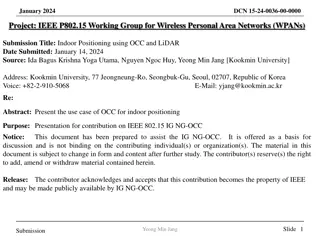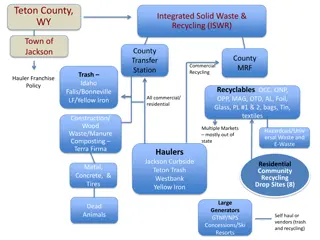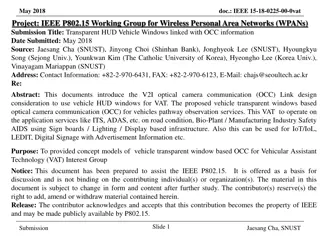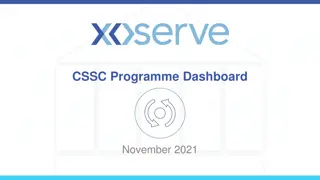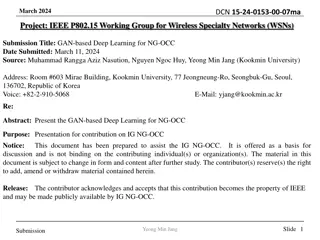OCC NPR Part 7 Activities & Operations Update
Providing insights into the key areas highlighted in a comment letter related to the permissibility of derivatives activities, hedging techniques, and risk management implications of new activities by national banks and Federal Savings Associations. Recommendations aim to streamline processes and enhance clarity to modernize the OCC's permissible activities framework.
Download Presentation

Please find below an Image/Link to download the presentation.
The content on the website is provided AS IS for your information and personal use only. It may not be sold, licensed, or shared on other websites without obtaining consent from the author.If you encounter any issues during the download, it is possible that the publisher has removed the file from their server.
You are allowed to download the files provided on this website for personal or commercial use, subject to the condition that they are used lawfully. All files are the property of their respective owners.
The content on the website is provided AS IS for your information and personal use only. It may not be sold, licensed, or shared on other websites without obtaining consent from the author.
E N D
Presentation Transcript
OCC NPR on Part 7 - Activities and Operations of National Banks and Federal Savings Associations September 15, 2020
September 15th Meeting Agenda Introduction Certain Key Areas Highlighted in BPI s Comment Letter Permissibility of derivatives activities Assuring permissibility of appropriate hedging techniques Clarifying and rationalizing the EIC notice requirements to reflect the risk management implications of new activities Clarifying the parameters of the physical hedging authority involving commodities Technical clarifications and definitions Tax equity finance investments Eliminating proposed size caps in view of other applicable safety and soundness-related safeguards Eliminating unnecessary proposed approval/notice processes on a deal-by-deal basis Payment system membership Other key topics: National bank powers, branching and corporate governance Finder authority Letters of credit Branching - financial literacy programs Updates to form articles of assn. pg. 1
Introduction Overview BPI strongly supports the goals of the NPR and many of the specific ways in which the OCC has proposed to bring greater certainty and predictability to part 7 s activities framework. At the same time, we also believe there are a number of ways in which the proposal may be improved and strengthened by further streamlining unnecessary processes or burdens, clarifying certain conditions or requirements, or expressly addressing specific questions not resolved under the proposal. Our recommendations are intended to build upon and further the proposal s goal of clarifying and modernizing the OCC s permissible activities framework. As we describe throughout this letter, clear rules around legal permissibility and, where necessary, the opportunity to consult with the OCC s legal and policy leadership to resolve any legal permissibility questions, in an efficient and transparent manner, serve the important purpose of fostering innovation, supporting bank compliance efforts, and ensuring a level playing field. They also serve to ensure that questions of safety and soundness, as overseen by examiners, remain separate and distinct from questions of legal permissibility, as established by law and regulation. Accordingly, we believe that the proposed rule, as refined by the suggestions set out in the comment letter, would serve the public interest by providing national banks and FSAs with more clear, consistent, and transparent rules relating to the parameters of bank-permissible activities. These slides have been prepared for presentation purposes only. Please refer to BPI s comment letter to the OCC (dated August 3, 2020) for a more complete and detailed explanation of the points addressed herein as well as several other key recommendations and considerations. The BPI comment letter is available at: https://bpi.com/wp-content/uploads/2020/08/BPI-Activities-and-Operations-of- National-Banks-and-Federal-Savings-Associations-2020.08.04.pdf. Capitalized terms used herein and not defined have the meanings assigned to them in the BPI comment letter. pg. 2
Annex BPI Recommendations Addressed in the August 3rd Comment Letter (September 15th meeting agenda topics are highlighted) pg. 3
BPI Recommendations - Derivatives Permissible Derivatives Activities: The final rule should make clear that national banks may continue to rely on guidance that they have previously received regarding the permissibility of derivatives activities and need not provide notice under proposed new 7.1030 to continue to engage in activities that were commenced under the prior interpretive and supervisory framework before the final rule became effective Certain of the key definitions proposed for purposes of new 7.1030 should be revised to align with OCC precedent and market practice: The final rule should clarify the definition of customer-driven to reflect that such transactions may serve a customer directly or indirectly; The final rule should adopt the broader concept of appropriately hedged rather than unnecessarily distinguishing between perfectly-matched and portfolio-hedged however, if these terms are adopted, the final rule should make clear that they are together intended to cover all derivatives transactions the market risks of which are appropriately hedged, regardless of the technique employed to do so; To the extent it is retained, the definition of perfectly-matched should be expanded to reflect the broad range of prudent market practices employed to offset risk; The final rule should clarify that the definition of underlying should be construed broadly; and There is no need for the final rule to define derivative, but should it do so, the definition must be appropriately broad so as to avoid inadvertent exclusion of common derivative products; The proposed set of permissible derivatives transactions in 7.1030(c) should be revised to provide for permissible physically- hedged derivatives activities that are cash-settled, as well as physically-settled; pg. 4
BPI Recommendations - Derivatives Permissible Derivatives Activities (cont d): The notice requirements in 7.1030(d) should be revised to ensure consistency in supervisory standards and to clarify that the proper role of supervisors in evaluating derivatives activities relates to consistently applying safety and soundness standards, not evaluating legal permissibility; The notice requirements also should not define categories of underlying by regulation, but rather should take a substantially more principles-based approach to determining when prior notice is required that looks primarily to the risk management implications and challenges of any potential new derivatives activity: No notice should be required under the final rule where a national bank engages in permissible derivatives activity that is hedged either (i) using mirrored transactions that involve no market risk or (ii) on a nearly perfected-matched basis that involve only de minimis residual market risk; and The final rule should provide greater clarity as to the scope and substance of any additional requirements imposed on physical hedging involving commodities, and should require that any physical hedge be at least as effective as, not more effective than, a cash-settled hedge. pg. 5
BPI Recommendations Tax Equity Finance TEF Transactions: A national bank or FSA should not be required to obtain a legal opinion on the tax benefits of a TEF transaction, but rather should be required to have a good faith, reasoned basis for making that determination; Several of the criteria for the qualification of a TEF as a functional equivalent of a loan should be clarified: The final rule should clarify the definition of customer-driven to reflect that such transactions may serve a customer directly or indirectly; The final rule should clarify that TEF investments may be retained for the duration needed to obtain the expected rate of return; The final rule should clarify that the calculation on rate of return is the expected rate of return at the time that the investment is initially made; and The final rule should clarify that customary protective rights and covenants are permitted and do not violate the passive investor requirement; The proposed set of permissible derivatives transactions in 7.1030(c) should be revised to provide for permissible physically-hedged derivatives activities that are cash-settled, as well as physically-settled; The final rule should clarify that national banks and FSAs have appropriate flexibility in satisfying the requirement that they not control the sale of energy from a TEF project; The final rule should not impose a cap on TEF transactions by national banks and FSAs; The final rule should not require notice before a national bank or FSA engages in a TEF transaction; National banks and FSAs should be permitted to enter into the TEF transactions about which the OCC has requested comment; The final rule should not prescribe any particular contractual remedy for TEF transactions, but rather should allow national banks and FSAs the flexibility to choose the most appropriate remedies for a given transaction from among a range of permissible options; and The final rule should not prohibit national banks and FSAs from participating in fund-based TEF structures. pg. 6
BPI Recommendations - Payment Systems Payment System Memberships: The final rule should clarify the OCC s risk management expectations by incorporating the relevant factors in previous interpretive letters; A national bank or FSA that believes its open-ended liability is otherwise limited should not be required to obtain a legal opinion to that effect, and instead should be required to have a good faith, reasoned basis for making that determination; The definition of operational loss should be adopted largely as proposed, and cybersecurity breaches should be added to the list of examples; and The final rule should acknowledge that, notwithstanding the requirement that national banks and FSAs complete their risk assessment of the payment system before joining, certain key aspects of the national bank s or FSA s risk management processes may occur after joining. pg. 7
BPI Recommendations Other National Bank Powers or Operations Other Bank Powers or Operations: The final rule should simplify the requirements for operating financial literacy programs. The examples of permissible finder activities should be revised to reflect how this authority is exercised in the modern financial system; We support the OCC s proposal that a national bank operating subsidiary facility is not a branch if it provides similar services on substantially similar terms and conditions to customers of unaffiliated entities, including unaffiliated banks, but suggest that this provision apply equally to facilities of the national bank itself; The final rule should clarify that it is not impermissible to perfect security interests by holding collateral stock as nominee; The final rule should clarify that a national bank s ability to hold or invest in a SBIC does not terminate if the SBIC surrenders its license during its wind-down period; The final rule should reinforce that the risk management considerations outlined for letters of credit and independent undertakings are not mandatory safety and soundness conditions by removing them from the text of the rule; The final rule should clarify that nothing in proposed 7.1016 is meant to imply that other sections of part 7 do not apply equally to federal branches and agencies as to national banks and FSAs, consistent with the International Banking Act; We support the OCC s proposed updates to the types of emergency conditions that may result in the declaration of a legal holiday; and The final rule should affirm that national banks and FSAs have multiple sources of legal authority on which to rely in engaging in a particular activity, and need not meet the specific terms of part 7 where another authority is available, the conditions of which are met. pg. 8
BPI Recommendations Corporate Governance Corporate Governance: The OCC s form articles of association, bylaws, and other form documents should be reviewed to confirm that they are consistent with applicable federal banking statutes and regulations; We support the proposal to allow national banks to elect to follow the corporate governance provisions of the law of any state in which the main office or any branch of the bank is located, among other options; Section 7.2009 should be revised to allow national banks to adopt the quorum requirements of the law of the relevant state, the Delaware General Corporation Law, or the Model Business Corporation Act, as applicable; We generally support the OCC s reorganization of indemnification requirements and offer the following comments in particular: The final rule should clarify how the OCC would evaluate whether indemnification payments to institution-affiliated parties ( IAPs ) under redesignated 7.2014(a) are consistent with safety and soundness ; The final rule should confirm that the written agreement required under proposed 7.2014(c) may include funds to cover expenses; The final rule should not adopt the requirement from 12 C.F.R. 145.121 that, in certain circumstances, a majority of the disinterested directors determine that the IAP was acting in good faith before the institution may indemnify the IAP; and We support the OCC s proposal not to require 60-day notice to the OCC before a national bank or FSA makes an indemnification payment; and Section 7.2010 on directors responsibilities should be revised to avoid suggesting that guidance has the force of law. pg. 9
BPI Recommendations Covid-19 Related Relief COVID-19 Related Relief: We encourage the OCC to codify additional ways in which filings and other procedures can be accomplished electronically; and The requirements for filing oaths of directors should be modernized. pg. 10
